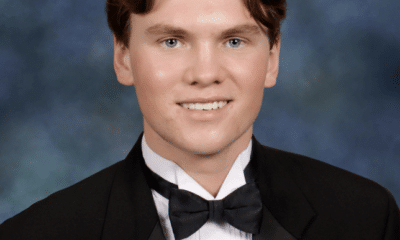City Government
American Rescue Plan, LPR Cameras and More on Prime Lunchtime with the City Manager
Published
4 years agoon
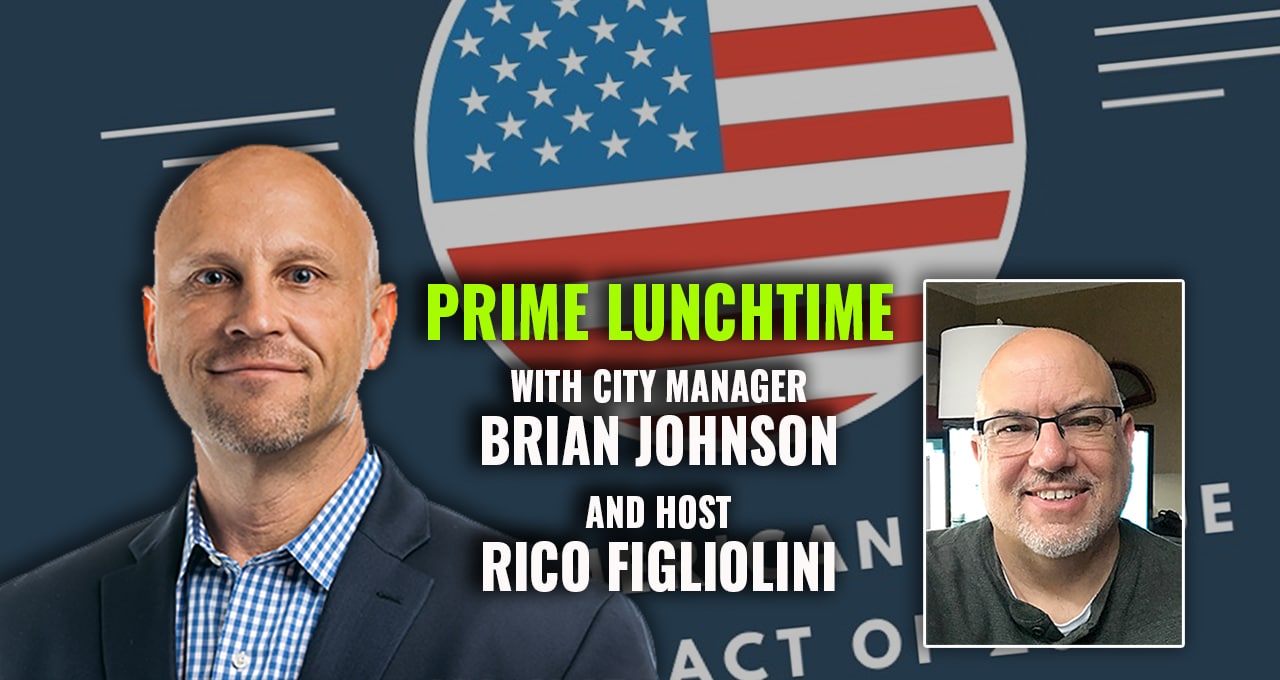
It’s a brand new month and that means more exciting news about the city. In this episode of Prime Lunchtime with the City Manager, Brian and Rico discuss the American Rescue Plan Act, success stories of the LPR Cameras, exciting developments, and much more.
“We have a lot more flexibility this time than CARES Act. But there’s also greater need than we’ll have the money for… Mayor and council are going to be carefully considering the options and what percentage goes to all of it. But suffice it to say this money is going to be put back into those in the greatest need within the Peachtree Corners community.”
Brian Johnson
Timestamp:
[00:00:30] – Intro
[00:01:14] – LPR Cameras
[00:08:05] – Details about the American Rescue Plan Act
[00:18:49] – MUD Amendment
[00:28:14] – Multi-use Development
[00:33:06] – Closing
Podcast Transcript
Rico: [00:00:30] Hi, this is Rico Figliolini host of Peachtree Corners Life. And here now with Prime Lunchtime with the City Manager, Brian Johnson, who I’ll be bringing on shortly. We’re going to be discussing a few different issues, including multi-use development ordinances and things that are happening in the city. And I hope you stay with us. If you have any comments, certainly put it into the comment section. If you have any questions, we’ll get back to you with answers, hopefully. Bring it on to the next show as well. This episode is being sponsored by Peachtree Corners Magazine as we’re working on our next issue. So keep an eye on it. It’ll be out the first week of June. So let me introduce, and let me bring in well you’ve seen before, Brian Johnson, City Manager. Hey, Brian, how are you?
Brian: [00:01:12] Good Rico. How are you?
Rico: [00:01:14] Good. It’s been a little while since we had the last one and certainly there’s things going on in the city. So exciting stuff. Why don’t we, you know get, well why did we start with I think one of the things that we’ve talked about before has been the LPR cameras. The license plate reader cameras that’ve been installed in the city. And why don’t you tell us what happened recently? I think that was brought up at city council meeting as well. Something good, obviously from that.
Brian: [00:01:40] Well, so the mayor and city council was referencing a report that was published through by flock. And it was in reference to the license plate reader cameras, the automated license plate reader cameras that we installed for use by Gwinnett PD. And so we installed 25 of them throughout the city in locations that Gwinnette PD identified as locations that could provide them opportunities for, you know, use in, you know, the prosecution and, well investigation and prosecution of crime. So those were installed and they’ve been up for a number of months and we got a report back on how it was used and why the mayor brought it up to city council meeting is because he wanted everybody to kind of know that they were being put to very good use. That there were a number of instances in which a vehicle pass through one of the cameras, the camera read the license plate. The license plate had been on what’s called a BOLO list, a be-on-the-lookout list by Gwinnett PD for a specific reason. There were issues like an individual registered to the vehicle is wanted for assault and battery somewhere or grand theft auto, car was reported stolen. Things like that. And in one case, we actually had, in fact, two cases, really. We have had instances, unfortunate instances, where we’ve had a discharge of a firearm within the city. One, thankfully involved, two individuals who were near the forum, in the forum area who had gotten inebriated and decided to pull out their firearms in the parking lot and shoot them in the air in celebration of something. Anyway, it was gunfire in the air, but it was still gunfire. And they got in their car and Gwinnett PD, when there was a report of gunfire, looked at the camera and saw the vehicle that had been identified as to what the shooters had gotten into and were able to follow the car and ultimately apprehend the individuals who were firing their guns. That was helpful. And then we also had an unfortunate incident two weeks ago, I guess, two to three weeks ago in which there was a homicide at a gas station in South Peachtree corners. And the shooter was identified through our LPR cameras. Because again, an eye witness put the shooter in a type of automobile, and then they used the, you know, the network of cameras that were installed to ultimately trace where the car left and they use cameras that they have access to even outside Peachtree Corners. And we’re able to ultimately find out where the car went to. And then we’re able to go to location and find out through the use of that automobile, who the individual was. I don’t know, since then, I haven’t actually had a conversation to know if they found him. But they actually, because of that camera were able to put his mugshot, because he had a record out, as a BOLO. And so, you know, he is wanted for murder and it was through the help of these LPR cameras. So they are being used again, the city doesn’t have access to the cameras. They’re being used by Gwinnett PD for these purposes, but it is being put to use, and it is taking criminals off the street and it is helping solve crime. Because they have access to these cameras. So it was a great thing for the city who doesn’t run a police department directly within our city government. We have a governmental agreement for Gwinnett County, but it was a great way for us to provide them an additional crime fighting resource and provide it at their disposal. So that’s why it was brought up. And that’s what the program’s about.
Rico: [00:06:01] Interesting. The, you know, the fact that cameras more and more today, whether it’s a Ring camera on your door or a camera like this, it’s just providing that much more security. The ability at least to follow up crimes, to find the perpetrators of these things. And it just makes, you know, some people will feel safer. I certainly would feel safer that way. Some people might not feel, they feel like they’re being intruded upon. But you know it’s interesting, the same people may want more police on the street. But this is exactly what that is, right? It’s allowing police to be able to do the job more effectively in a broader range. Of course, I don’t know, you know, somebody may not want that, may not feel it’s necessary. But I certainly feel in a city this size that that’s certainly worth it.
Brian: [00:06:50] You know, so I certainly, and the city mayor council certainly, appreciate the concerns about invasion of privacy and all of that. It’s important to note that these cameras are only on public thoroughfares. They’re only used in you know, the prosecution of current crime. And it also is interesting that for the total amount that it costs to operate 25 cameras at 25 different locations in the city is still less money than it would be if we put one additional police officer on the street.
Rico: [00:07:30] Wow.
Brian: [00:07:31] And so, not to say that you don’t have to have both, you absolutely do. But when you are trying to stretch money or provide the biggest bang for the buck, you know, the most bang for the buck. It’s a pretty good resource to be able to deploy that many eyeballs. You know, obviously it can’t do anything. You still need boots on the ground to make the arrest and do the other stuff, but it is certainly a force multiplier for departments you know. And we feel good about being able to provide them this additional resources.
Rico: [00:08:05] Yeah. I’m glad the city is doing it. And you’re right. I mean, it does provide a bigger bang for the buck if you will for safety’s sake. So also, you know, the city has been doing in other areas like we did, like the city did last year, getting onto a different subject about business grants through federal rescue plan. The CARES Act. And providing businesses with the ability to continue their business. Large and small, through a variety of grants. Same thing’s happening this year, right? Through the American Rescue Plan now. The first half of this year grants will be given out. And then I guess the second half of the year, some additional monies will be given out. So can you talk a little bit about that? About the type of businesses that would qualify for this, the monies that would be there, and what would qualify business to be able to receive that?
Brian: [00:08:54] So, the American Rescue Plan Act, like you said, it is a second attempt by the federal government to inject, you know, resources into the economy. To help those who have been affected by COVID. And either help them, you know, keep propping them up for them to live to fight another day and make it through this or help them recover from it, whatever. So we are going to be getting about $9 million over the course of the next 12 months. Half within about the next 30, 45 days. And then the second half a year from when we get the first check.
Rico: [00:09:39] Gotcha.
Brian: [00:09:40] And the money is in fact to go towards certain things. Now, this one, versus the CARES Act has got a lot more guidance and a lot more, in fact I have right here. The CARES Act was basically like, look, if you could show that you were you know, harmed financially due to the pandemic that CARES Act money could go to help with that. So you could show that you lost revenue or you had COVID related expenses. That was basically all the guidance we were given. This time it’s a little bit more specific. The eligible use of funds falls under basically four categories. One is investment in water, sewer and broadband infrastructure. One is for provision of government services to the extent of the reduction in revenue. In other words, the city or counties could use this to plug holes in revenue streams that are decreased due to COVID. Three, it would be responding to workers performing essential work during COVID. And this would be essentially to pay, cities pay themselves back for extra time that police or fire were out there or for hazard pay or those kinds of things. And then the last one is for assistance to households, small businesses and nonprofits, or to aid in impacted industries, such as tourism, travel and hospitality. And that’ll be the main one that we’re going to end up having you know, that eligible use will be the main one we’re using. And so we’re looking at breaking the money up into a few different categories, if you will. We do think that there will be a component of it that will go to companies directly that were impacted to help their bottom line, to help keep them afloat. Similar to the CARES Act. We do think that there will be some going to nonprofits that are specifically providing service to Peachtree Corners residents. You know, and those nonprofits, their mission would be to provide some sort of assistance to groups that were affected. So we didn’t do non-profits last time, we did it directly to businesses. We will definitely have a non-profit component this time. We are probably looking at some sort of a capital improvement component. And by that, I mean, there may be some money eligible for businesses that are seeing, that have property maintenance needs that they’ve been unable to address because of either they didn’t have enough money during COVID or they had to spend more money because of COVID and they don’t have to do it. And the reason that’s there is because we may have businesses that go, that, you know, fold or leave. But the structures that these businesses occupying the city will rot. So we are worried about there being some, you know, derelict buildings and structures that are left behind by businesses leaving. So we want to make sure, in some cases it would be us giving money to a business, but we say here’s money for you, but you can’t just use it wherever you want. You have to use it on your building or on your property.
Rico: [00:13:15] So would that be something like, you know, and maybe this is not, but like that Burger King building on Spalding and Holcomb Bridge. Burger King closed down that building, it’s been abandoned essentially for a while now. Obviously an eyesore and could be dangerous as well. You know, does money go towards maintenance or also towards raising a building? You know, bringing it down or something.
Brian: [00:13:38] It could probably ultimately go to both. Now, the city won’t end up using it to demo it itself, but we could give it to an owner of said, structure and say, hey, if you’re looking to redevelopment and you couldn’t quite get over the hump because of COVID, let’s help you do something productive with that building or let’s help you bring it back up into code compliance. Or let’s have, we’ll let you use the money for some facade improvements because the facade needs, you know, a facelift. That would be some aspect. Again, the percentages are still yet to be determined. That’s going to probably be the biggest thing is what percentage of this pot of money do we do to each of these categories? Because you can do a lot in one and, you know, and end up creating a problem or the need is greater than another you didn’t do it in. And so those are some of the things we’re doing. Now, you know, we’re even looking into maybe helping those who could be behind on certain utilities. They were unable to pay certain utilities and we can centrally pay like a Georgia power, or a Gwinnett County department of water resources, you know, for delinquent utilities. For those who wash their jobs or whatever. We’re exploring that. You know, and certainly the hotel and restaurant business are ones that we’re looking specifically at. Because you know, there was a time and even with hotels that you know, or I guess restaurants that, you know, they’re still not back to normal.
Rico: [00:15:16] Right. Well, and some of them are doing improvements. Like I know that I saw Fire and Stone Pizzeria just added a canopy on top of their outdoor patio.
Brian: [00:15:27] And we work with them to increase the area outside so that he could have more seating out there because people are a little bit more apt to eat right now in places that they can eat outside. And so restaurants are needing to do that. And so, yes. I mean, so there’s a lot of need. We have a lot more flexibility this time than CARES Act. But there’s also greater need than we’ll have the money for. So we’re, you know, mayor and council are going to be carefully considering the options and what percentage goes to all of it. But suffice it to say this money is going to be put back into those in the greatest need within the Peachtree Corners community.
Rico: [00:16:11] Is there going to be sort of a public hearing or something to gather input from people that might want to suggest where the money gets put? Or is there a component of something like this or how is this drawn up? Because then people will have to apply for it, right?
Brian: [00:16:27] Right. Now there will be an application process. Once mayor council decide how it’s going to go, then we will then take it and create all of the background and the notification about what is coming. I will tell you when the announcement of the rescue plan act came out. Since that point, I have had a steady stream of recommendations since then. So I’m not voiding community input. And I know mayor and council are in the same boat. But, you know, I gave you the eligible use of funds and it has to meet that for us to spend it. So while we have a few more types of uses than CARES Act did, we are still heavily regulated on how it’s done. And we will always err on the side of caution. And we do not want to be like some of the other horror stories that you hear out there of communities that have, you know, misused this stuff and now they’re in trouble. And you know, we’re not going to do that and we didn’t do it the first time. So we’ll be very careful of how we spend it.
Rico: [00:17:29] So the deadline at some point will be over the next 30 to 45 days, I guess, if someone. I mean, officially you’ll put out, the city will put out the application and the deadline date, I guess, that people can…
Brian: [00:17:40] Yeah, so let’s just say within the next 45 days, we should be receiving the first half at that point. And then a year from that point, we’ll get the second half. But regardless of when we get the money we have through the end of 2024 to spend it all. So we have a good time. Now I will tell you this, mayor and council are intent on spending the money the right way for the right use, but doing so as soon as we can spend it. Because they feel like the economy and people hurt by the pandemic are at their greatest risk right now. As more things open up and the pandemic, you know, hopefully goes away and we return back to whatever the normal looks like on the backside, but that people will be stronger everyday going forward into the future. So, we’re trying to put it into the local economy and help people as soon as we can. Because they’re at their greatest. You know, there’s a greater need today than there will be tomorrow. And then the next day and the next day.
Rico: [00:18:49] That makes sense. I mean, holding it for two or three years, doesn’t make sense. Yeah. And I can understand why they have that, I guess. But I also see why you’d want to put it out there sooner than later. Be more effective that way. Let’s get on to a couple of well actually let’s, I’m going to, I’ve been going through the city council agenda for those that are not aware that recently was held and stuff. So I’m going to be a bit out of order. There’s a first reading consideration of something that I’ve found interesting that before we started the show that I wanted to ask about. And this has to deal with like also COVID, it has to deal with the way life is changing, the way people are working, living and traffic and all that. So I know the city wants to get ahead of something like this, and this has to do with the apartment hotel and amendment to the zoning ordinance to allow apartment hotel, special use. And we were talking about that because on the face of it, I didn’t understand what that meant, but now I understand. It’s like, if you’re going to build apartments, you do it from scratch. Or do you find a hotel that has no occupancy or 20% occupancy, and maybe that chain needs to get rid of that less producing hotel. And now what do you do with it? So, you know, we were discussing how it’s cheaper obviously to take an existing building and repurpose it. That was one of the reasons. That the Peachtree Parkway multi-use development is repurposing the office building that’s there, right? Because it’s rather than taking it down and rebuilding a new one, you can just take what’s there and reuse it maybe. Same thing with hotels. So explain again to our listeners. What this amendment to the MUD means to the zoning ordinance, actually about hotels being converted if the opportunity arises.
Brian: [00:20:32] So what we’re seeing nationally and even in Peachtree Corners is the pandemic has really, you know, affected a lot of industries more than others. The hotel industry being one that’s been, you know, significantly impacted. And so there are hotel owners that are sitting on properties that just cannot make it anymore. And so some of these hotel owners are looking at what can I do with my property? I had this hotel that it was doing just fine. But now for, you know, pandemic reasons, it’s not. I don’t see it improving. People aren’t going to travel as much business travel is certainly not going to be the same. So they have started out of sheer desperation if you will, to explore what could they do with the property. And one of the things that they’re doing is exploring the possibility of converting a hotel into an apartment building. And so we have had at least one instance in which the owner kind of an exploratory way, said hey does the city have any regulation on its books for a conversion? So it got us thinking that, look, if this is going to happen here, like we’re seeing elsewhere we probably should do some things to at least try to keep it from getting out of hand, one. And then two, we are, mayor and council is I’d like to think that we won’t, but my fear is we’re going to be faced with a decision or two regarding this issue. And you’re going to have a hotel that probably has lost its corporate flag. You know, it’s no longer a Marriott property or a Hilton property or something like that. And now it’s just you know, a random hotel. And when that happens, and that means immediately the room rates are going to go down. You’re not going to be able to attract the same type of traveler. And desperate people do desperate things. And what we don’t want to do is to see hotels, transition like that, and then become locations for long-term stay. For people who are transient. You run into squatters, you run into sometimes crime. I mean, it’s just, it’s a broken window theory of things and you don’t want to go down that road. But then conversely, you’re always like, ah, you know, some cases hotels may not be in the best location for what you would think is a good location for apartments. And so it’s going to be a difficult one, but we are prepared for it to happen. And so what you’re referring is an ordinance that will set some regulations. That if somebody is wanting to do it, there’s the, you know, the baseline for what a conversion would look like if council approves it.
Rico: [00:23:36] So essentially, I mean, if I could extrapolate it, even now, because I was, as you were saying, it was thinking extended stay hotels. And hotels that I don’t know, you know, most people understand that sometimes hotels are not owned by the hotel chain. They could be franchises of a hotel chain. So they do lose their flags sometimes because for a variety of reasons, maybe. But they have to do something. And occupancy rates have been dropping and dropping. And even though they seem to be coming back, you know, people, I have friends that are traveling more. I see this. Cruise ships are going out a little bit more now. Hotels are filling up a little bit. But usually in the resort areas, right. Where, you know, a lot of our hotels were for business travelers coming into Technology Park and all that. So that’s changed a bit, right? So I can see this coming where someone may say, I have this 40 year old hotel, or 30 year old extended stay hotel. And I think we can make this into apartments because we already have extended stay guests. Why not just make it apartments? But I would imagine, I haven’t looked at the ordinance, but I would imagine there are special use approvals that are necessary and certain amounts of improvements have to be made. You can’t just be all of a sudden put a hotel when, I mean an apartment.
Brian: [00:24:54] Yeah, that’s a good point Rico. This is a transition process and it comes with a lot of prerequisites if it were to happen and it is a special use. So they’re going, it’s not an automatic conversion. It’s not a conversion by right. So council’s got to issue a special use permit for it to happen. But what we wanted to do is be prepared for if that ask comes, we wanted to be prepared to actually kind of have had a chance to think about, okay, what would we want to see if council were inclined to say yes in lieu of the alternative. And you know, again, there’s some, you know, horror stories about hotels that the owner either doesn’t care or can’t afford to do anything. And it’s just allowed, they just keep dropping the rates until they can fill the rooms. And they’re filling it with people who, you know, you don’t necessarily want in that housing.
Rico: [00:25:55] Sure, and it happens. I mean, crime unfortunately comes with that and we’ve seen it already in several hotels in the Norcross, Peachtree Corners area. So where there’s been a shooting or a death because of things like that, whether it was in the parking lot or whatever was being done. Are there specific things that you’d like to see if a hotel came to you with that aspect? Or are there a couple of top things that they have to do to even be considered for that type of conversion?
Brian: [00:26:24] I mean, conceptually speaking, I mean, I think the city is going to want to have these things to be self-contained. Meaning, you know, you’ve got a secure grounds, one in Egress point, you know, you want to keep it similar to that. You’re going to want amenities and make sure that the units are you know, occupied by, you know, people that we would like to see in apartments. There’s going to be a requirement. There are still, you know, pool, you know, and work out facility aspects to it. You know, you can’t just do away with that. There’s minimum square footage of units so that they’re not micro units.
Rico: [00:27:04] Right. Kitchen, and stuff.
Brian: [00:27:07] Right. So those are kind of some of the things. It’s got to be a real apartment. I mean, it is a real, it’s not this efficiency. It’s not, you know, where it’s gotta be a real conversion. But, you know, I think the one good thing, I guess on these conversions is, you know, the amount of rooms that you can get out of a hotel is like a quarter. You can get about a quarter or less apartment units out of the number of hotel rooms, just because hotel rooms are small. They’re not, you know, hotels, you know, usually these conversions involve multiple rooms being gutted to a degree and then combined into one apartment unit. You try to work around, maybe saving some of the plumbing where the kitchen would go. Keeping one of the bathroom locations, trying to work around that. But you know, they have the hallways. And the doors to the units, which are what an interior entry apartment would look like. And so those are kind of the conversions that we, you know, the conceptual things that we would like to see for conversion to even be considered.
Rico: [00:28:14] Okay, alright. There’s been other developments as far as the approval for multi-use, 9.2 acres. We reported on this before. I think it was mentioned also well on our website when that was approved this past city council meeting. So what’s the, you know, that’s an exciting thing, I think. Because we’re talking about a lot of units there. We’re talking about the multi-use first real type multi-use in the city, right? Development to a degree. When do you think that’ll, you know, what’s the timeline that they’ve expressed to the city that they may be doing this in?
Brian: [00:28:48] I mean, I think that they’re going to potentially start work of some sort within the next three to six months. Now, you know, what they’ve got to do is take the conceptual plan and then create construction documents out of that. And so there is a period of time that we all have to you know, remember. Upon council approval of these projects, the developer can only go so far until they have approval by council. Because it doesn’t make sense to go into the weeds of designing all the way down to construction documents, bid ready, if the risk that council could say no is still there. So companies only go so far. And so you’re going to see I think, you know, as that’s going on, you’ll potentially see some demolition of some of the single story office, condo complex. That’s all being demoed. And I don’t know the answer to this, but I know that there’s like at least one, maybe two leases that still need to run a little bit before the current occupant is relocating elsewhere. So there’s some more, but I think, you know, they’re going to want to do this as fast as they can. And so I think you may see selective demolition start before too long. I definitely know that they are knee deep in the architect’s transitioning into construction documents. And when they’re ready to go, they’re going to blow and go quick. I mean, these kind of things, they have construction loans and every day that they’re holding the money that they can’t turn around and start generating income off of selling townhomes or renting apartments is money that they’re losing.
Rico: [00:30:30] For sure. And I think with Janet Yellen and some of these other economists talking about an economy that might heat up a little bit where interest rates may start rising in a year or two. I get, I imagine that people will be looking to secure those loans sooner than later, because I can’t imagine getting it any cheaper than it is now, right? So cool. Well, I think we’ve covered most of what I wanted to get onto. You haven’t, have you heard anything more about the other apartment? That’s been approved, obviously at town center. Nothing more there, I guess? Or the original planned Indigo hotel, which doubtful that that’ll happen at this point. But anything going on there that you can share?
Brian: [00:31:12] No, there are some, there is some movement within the ownership group of that parcel that they may, there’s indications that they may be starting to, you know, compile all the information they need to get back in front of council. So I would not be surprised at that sometime over the summer it is there in front of the council. And you know, again, remember too council did deny the application for townhome community on Jaybird. That was at council meeting too. So, you know, council and planning commission, you know, together that went through a process and then the community was involved in letting both groups know how they thought. And ultimately, you know, city council was like, look, we don’t think that’s the right type of use for that area, too dense. It’s got a lot of, you know challenges to it and we hear the community and so they denied it. So, you know, all these cases, you and I tend to talk about them either, well, we talk about them a lot of times in conceptual you know fashion. Meaning it’s not been in front of council or it is done and what is it going to look like? But in the meantime, there’s a lot of details behind the scenes that are considered and debated. And council’s doing a lot of sausage-making when it comes to trying to get smart on these kinds of things and they take them each one very seriously. And sometimes they get approved pretty easily. Sometimes counsel through me, work very hard, trying to amend and adjust the original product from the day it hits the city to the day they’re voting on it. So it’s much different. Sometimes they just flat out deny it. And this is an example where they ultimately just denied it.
Rico: [00:33:06] Yeah. And you know, I know that the planning commission, and I know you guys spend a lot of time and effort in going through this and working with developers to make sure they understand what’s allowed, what’s not allowed. I know that particular piece of property was up against low density housing also, and didn’t make sense. But just because something on the face of it doesn’t look like it makes sense to do. It doesn’t mean that’s an easy, no, right? Because legally you have to also look at the right of use of a property and all that. So I’m glad that, you know, you guys are doing a great job. There’s very little that I’ve seen, ever seen that you all don’t do with what I feel that, you know, what I personally feel you guys need to be doing on it. And you know city council, but I, you know, I understand some people may think that’s an easy job and it’s a part-time job. And by the way, it doesn’t pay much. But city council people, as opposed to planning department people, or city government people that that’s a career job, right? You get paid good, you know, good money for doing a tough job. And city council people have to spend 20 hours, 30 hours a week sometimes in their job just to make sure they’re doing the right thing for the citizens. So that’s not an easy job either. So I’m glad that they have a good team behind them in city government being able to like come up with good answers, at least that they can, that they can work from.
Brian: [00:34:25] We try.
Rico: [00:34:26] Yeah, I’m glad that’s happening. So, and the city is doing well. So I don’t foresee, you know, I don’t see any, too many problems. I don’t see any problems out there really, quite frankly. So glad you all are doing a good job. Glad that you give us the time every month to be able to ask you questions and to get good solid answers and information from. Brian, I appreciate the work you do for us. So thank you everyone.
Brian: [00:34:51] Thanks Rico. Thanks for this opportunity and everything you’re doing to help, you know, disseminate information.
Rico: [00:34:58] Thank you, Brian. Take care. And everyone else, stay tuned for other episodes of Peachtree Corners Life and this episode that we do every month of this podcast. If you have questions, feel free to message me, email me. If you have story ideas, I’m all for that. I cover the city as well as we can. So if you have story ideas, suggestions, email me. It’s Editor@LivingInPeachtreeCorners.com. Any suggestions. Of course, that doesn’t mean we’ll put everything on the website or in the magazine, but if you’re not providing those suggestions to me, I have no idea where to get some of these ideas from. Although we’re overflowing with them as well. Does that make sense? Reach out to me. Let me know what you think and let me know if you have any stories or ideas as well. Thank you.
Related
City Government
The Future of Law Enforcement in Peachtree Corners: Community Meeting
Published
3 weeks agoon
April 14, 2025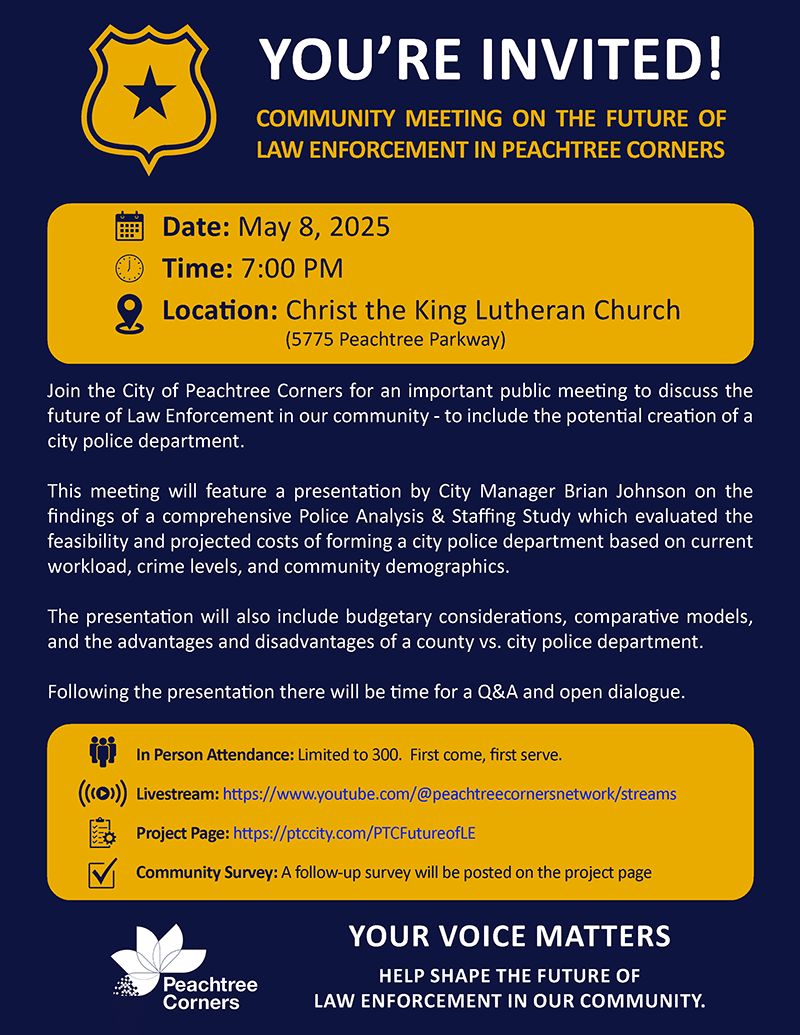
The City of Peachtree Corners will hold an important public meeting on May 8 to discuss the future of law enforcement in our community — including the potential creation of a city police department.
This meeting will feature a presentation by City Manager Brian Johnson on the findings of a comprehensive Police Analysis & Staffing Study that evaluated the feasibility and projected costs of forming a city police department based on current workload, crime levels and community demographics.
The presentation will also include budgetary considerations, comparative models and the advantages and disadvantages of a county vs. city police department.
Following the presentation, there will be time for a Q&A and open dialogue.
In-person attendance is limited to 300. First come, first served. A livestream option will be available for those who can’t attend in person.
After the meeting, a follow-up survey will be available on the city’s project page.
Meeting details
The Future of Law Enforcement in Peachtree Corners
Date/Time: May 8, 2025 at 7 p.m.
Location: Christ the King Lutheran Church (5775 Peachtree Parkway)
For more information, visit peachtreecornersga.gov.
Related
City Government
Councilmember Eric Christ: 2025 Peachtree Corners Municipal Elections
Published
2 months agoon
March 3, 2025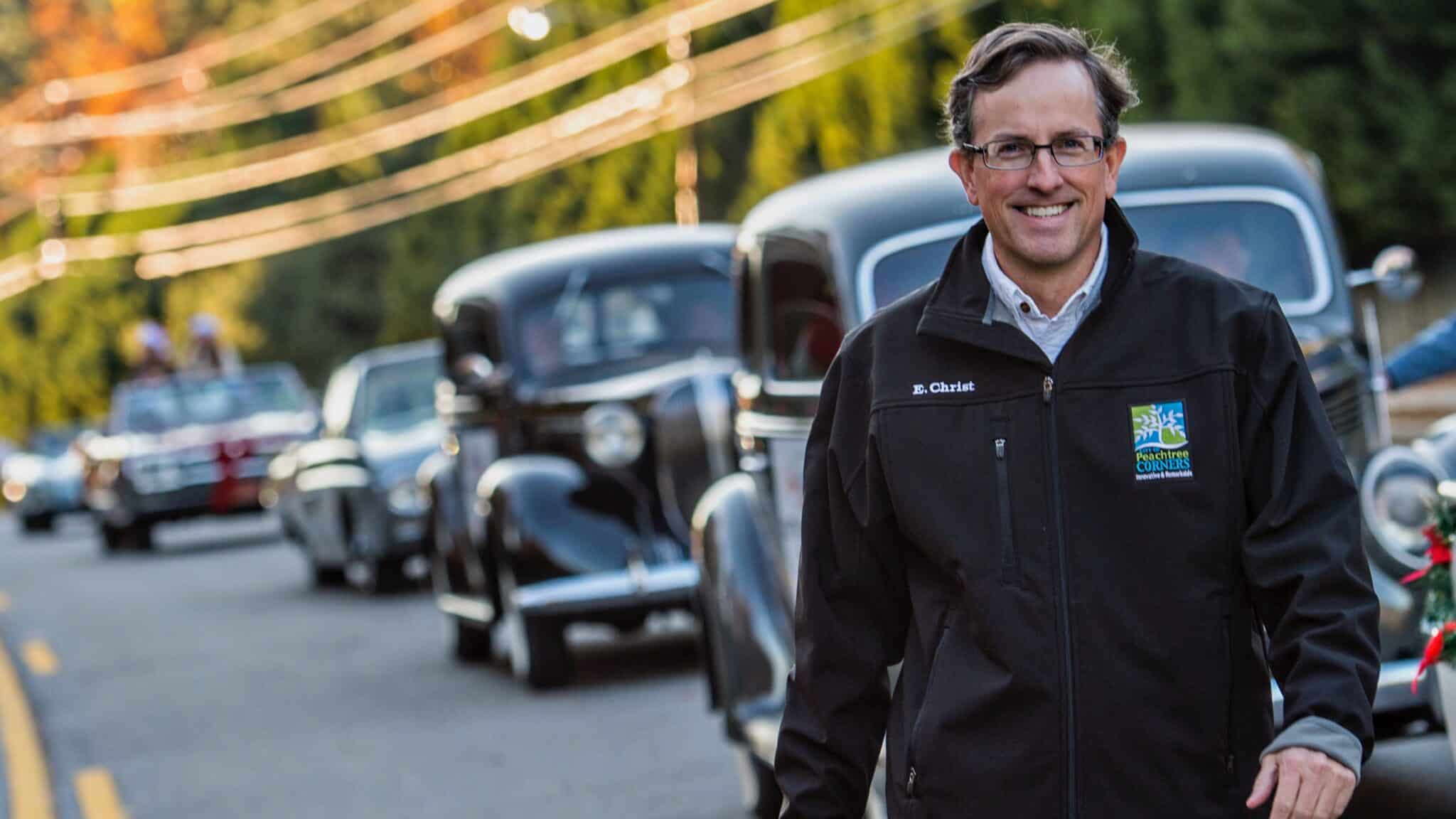
Source: Peachtree Corners Post 2 Councilmember Eric Christ’s recent newsletter.
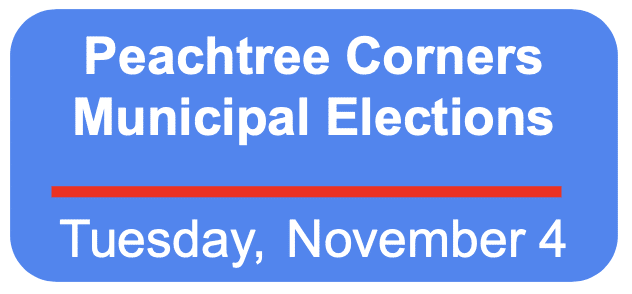
On Tuesday, November 4, we will have municipal elections here in the City of Peachtree Corners for three council seats. [And] for the first time since 2013, there will be a state-wide election on the same day as our city general election.
The state-wide election is to fill two seats on the Public Service Commission, which regulates Georgia Power and other utilities.
For the PSC election, the Gwinnett County Board of Elections will have all 156 county precincts open on November 4. Historically, Peachtree Corners has had a single voting location for city elections — at City Hall.
If we do the same this year, citizens who want to vote in both the PSC and the City Council elections will need to go to two places to cast their ballots.
A few years ago, I convinced the County Board of Elections to remove their prohibition against the Gwinnett Elections Department managing city elections. (Every county surrounding Gwinnett already offered this service to their cities.)
This means there is the potential of adding our city council elections to the county ballot.
I would like to hear your thoughts on the pros and cons of combining our city council races with the county’s for this year’s elections.
Please complete my brief survey by clicking here.

To sign up for Councilmember Christ’s newsletter or find him on social media, visit linktr.ee/votechrist.
You can read more from his latest newsletter updates here and here.
Related
City Government
City of Peachtree Corners Receives Distinguished Budget Presentation Award
Published
3 months agoon
January 31, 2025
For the eighth year in a row, the City of Peachtree Corners has been esteemed with the Distinguished Budget Presentation Award. This award was presented by the Georgia Finance Officers Association (GFOA) for the City’s Fiscal Year 2025 budget submission.
The award represents a significant achievement by the entity. It reflects the commitment of the governing body and staff to meeting the highest principles of governmental budgeting. To receive the budget award, the entity had to satisfy nationally recognized guidelines for effective budget presentation. These guidelines are designed to assess how well an entity’s budget serves as a:
- policy document
- financial plan
- operations guide
- communications device
Budget documents must be rated “proficient” in all four categories and in the fourteen mandatory criteria within those categories to receive the award.
Certificate of Recognition
When a Distinguished Budget Presentation Award is granted to an entity, a Certificate of Recognition for Budget Presentation is also presented to the individual(s) or department designated as being primarily responsible for having achieved the award.
“Congratulations to the entire finance team on receiving this award,” said City Manager Brian Johnson.
“This recognition is a testament to our team’s hard work, professionalism and commitment to excellence.”
There are over 1,700 participants in the Budget Awards Program. The most recent Budget Award recipients, along with their corresponding budget documents, are posted quarterly on GFOA’s website.
Award recipients have pioneered efforts to improve the quality of budgeting and provide an excellent example for other governments throughout North America.
About the GFOA
The Government Finance Officers Association (GFOA) advances excellence in government finance by providing best practices, professional development, resources and practical research for more than 21,000 members and the communities they serve.
About the City of Peachtree Corners, Georgia
As the heart of what is being called #SiliconOrchard in the metro Atlanta region, Peachtree Corners is a vibrant municipality that’s home to more than 45,000 residents and an innovation hub that houses some of the world’s most disruptive technology companies.
As the United States’ premier smart city powered by real-world connected infrastructure and 5G, Peachtree Corners serves as the model for how government and private industry can better collaborate to create a better future for society and business.
From the world’s first deployment of teleoperated e-scooters to fully autonomous shuttles being utilized by actual residents, and from a solar roadway to the largest electric vehicle charging hub in the region, Peachtree Corners is where the most future-forward Internet of Things (IoT) and sustainable technologies come to life for the benefit of its people and the world.
For more information, visit peachtreecornersga.gov.
Related
Read the Digital Edition
Subscribe
Keep Up With Peachtree Corners News
Join our mailing list to receive the latest news and updates from our team.
You have Successfully Subscribed!

GA Tech, Peachtree Corners Solidify Partnership with First-of-its-Kind Venue

Peachtree Corners City Guide 2025: Spring/Summer Digital Edition

Two Peachtree Corners Business Leaders Named Finalists for EY Entrepreneur Award

GA Tech Launches First-of-its-Kind GT Atrium in Peachtree Corners

Katherine Lafourcade — A Journey of Passion, Resilience and Giving Back

PCBA Announces 2025 Scholarship Winner

Paul Duke STEM High School Student Earns CGO Scholarship

Paul Duke STEM High School Student Earns CGO Scholarship

PCBA Announces 2025 Scholarship Winner

Katherine Lafourcade — A Journey of Passion, Resilience and Giving Back

GA Tech Launches First-of-its-Kind GT Atrium in Peachtree Corners

Peachtree Corners City Guide 2025: Spring/Summer Digital Edition

Two Peachtree Corners Business Leaders Named Finalists for EY Entrepreneur Award

GA Tech, Peachtree Corners Solidify Partnership with First-of-its-Kind Venue

SCB Construction Group Partners with CGA Reps on New Peachtree Corners HQ

Light up the Corners [Video]

Capitalist Sage: Business Leadership in Your Community [Podcast]

Cliff Bramble: A Culinary Adventure through Italy

Top 10 Brunch Places in Gwinnett County

A Hunger for Hospitality

THE CORNERS EPISODE 3 – BLAXICAN PART 1

Top 10 Indoor Things To Do This Winter

The ED Hour: What it takes to Remove Barriers from Education






